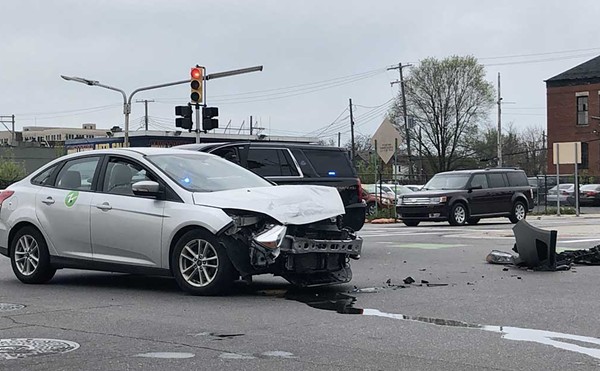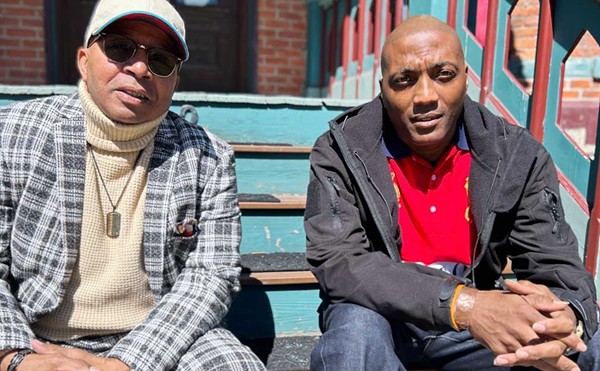It was a delightfully quirky place to talk about matrimony. Inside Q, Ferndale’s cavernous gay nightspot, the Affirmations Lesbian and Gay Community Center sponsored a discussion of the gay marriage debate. Due to the exceptional turnout, the organizers made a last-minute decision to relocate the talk from their offices to the commodious nightclub. Hundreds gathered in the dim discoteque amid fake palm trees, purple velvet curtains, and, of course, a massive disco ball.
But Stonewall this wasn’t. The alcohol- and smoke-free event featured shirts-and-slacks attire and bottled water. Behind the stage hung a U.S. flag with only 14 stars, representing the 14 states where gay and lesbian couples enjoy civil rights protections against housing and employment discrimination. This grim backdrop set the tone for an evening of hard-headed political realism, softened by the tenderness of hand-holding couples in the audience.
These are pivotal times for Michigan lesbian and gay activists, coming on the heels of President Bush’s announced support for an anti-gay marriage constitutional amendment and just days after the Michigan House’s Family and Children’s Services Committee approved a resolution in favor of a similar amendment to the state constitution. The event’s organizers and attendees view the battle over same-sex marriage as part of a larger attack on LGBT (lesbian, gay, bisexual and transgender) gains in recent years. They say an amendment would slam the door on legal challenges for their civil rights.
Getting it straight
It was a night of debunking sound bites and conventional wisdoms about gay marriage. With the religious right arguing for an overarching definition of marriage as a union between one man and one woman, it’s easy to forget what’s being debated.
The battle has nothing to do with the sacramental marriages performed by clerics. At issue is the possibility of federally recognized civil marriage – and all the federal rights that come with it. Experts say there are more than 1,000 federal benefits a civil marriage confers upon a couple, including automatic parental rights for a child born to one’s spouse, the right to inherit property, visitation rights, adoption rights, the right to make medical decisions or for a spouse to be eligible for citizenship. According to 2000 census figures, there are at least 15,000 gay and lesbian households in Michigan, none of which is able to ink that ultimate civil contract and enjoy its protections.
If federal courts recognized gay marriage as civilly valid, religions would still abide by their own ecclesiastical laws.
Arguing on the fringes
The Republican end run around the judiciary would be a gay marriage amendment that wouldn’t just block new civil legal marriages, it could roll back all civil unions or domestic partnerships already established by state law, according to the ACLU attorney Jay Kaplan.
Given gay and lesbian civil rights strides since the ’60s, the all-or-nothing nature of this battle has shaken the community’s complacency. But they are shaping their response cautiously. If many leading Democrats are polite but chilly with gay marriage, advocates of same-sex unions are careful to try to convince their opponents with hard numbers.
They confront politicians with the costs of freezing same-sex couples out of their civil rights. As just one example, prohibitions against gay marriage raise health care costs for working parents unable to share their health benefits.
Openly gay Oakland County Commissioner David Coulter told the gathering of his battle with fellow Commissioner Tom McMillin, an ultraconservative, over an Oakland County resolution requesting a Michigan gay marriage ban. Coulter was able to swing five Republicans against the resolution.
“We used arguments like, ‘This is harmful to Oakland County’s economic development. How are we going to attract employers to Oakland County, especially high-tech employers who have diverse workforces, if we’re going to brand ourselves the county of intolerance? … What kind of message does it send when our largest employers, including Chrysler and General Motors, have … corporate policies protecting gay and lesbian people … from discrimination, that the county in which they work wants to attack those rights?’”
After pointing out that Michigan suffers from an exodus of college graduates, Coulter added, “This is supposed to be Automation Alley, a major competitor to Silicon Valley. How can we compete with San Francisco?”
In addition to being divisive, a state constitutional amendment would be redundant. Kaplan pointed out, “It’s not necessary. We already have two laws in Michigan that prohibit same-sex marriage that are already on the books.”
Coulter asked, “With all these larger problems to deal with, the lack of jobs, the lack of access to health care, why bring this up?”
The wedge
One reason to bring it up is that it has the potential to sap the left’s strength. Even as it galvanizes gay and lesbian activists, it’s energizing the right and polarizing the electorate.
Political analyst Bill Ballenger, editor of the newsletter Inside Michigan Politics, says Republicans are trying to divide the left as the election looms.
“This is an issue on which the Republicans are unified. And plainly there are Democrats who do support this [gay-marriage ban]. This is a classic wedge issue. Democrats traditionally use economic wedges, and the Republicans use social wedges, and this is Exhibit A for that.”
While Ballenger believes Republicans are sincere, he insists that “they’re not naive in the sense that they think they’ve got a winning issue. And all the public polls show that they do.”
If the Republicans have a wedge, divisive Democratic Detroit may be ready to be split like dry timber. Curiously, none of the strategists in Ferndale discussed the most likely place for a split in the left to occur: Eight Mile Road.
According to Ballenger, the issue could be particularly volatile among African-American voters who, although decidedly liberal as a group on economic policies, skew toward the right on social issues because of the church’s strong influence in their communities. But, among the almost entirely white crowd gathered at the Ferndale forum, the racial dimension to this issue languished in an apparent blind spot.
For his part, the Rev. Al Sharpton appears to be attempting to head off a rift between white and black Democrats over this issue by broadening the context. Clearly, Sharpton, the highest profile black activist in the nation today, sees gay marriage as a civil rights issue.
“This is an issue of human rights,” proclaimed Sharpton during a recent Democratic presidential candidate debate in Los Angeles. “And I think it is dangerous to give states the right to deal with human rights questions. That’s how we ended up with slavery and segregation going forward a long time. … And all of us ought to be united that he [Bush] does not scapegoat the gay and lesbian community like he did minorities four years ago.”
It’s a view that influential African-American television and radio personality Tavis Smiley seems to share, a worry that it’s gays today and blacks tomorrow.
But this larger civil rights solidarity is more a shrewd politician’s alliance than a genuine grassroots sentiment in Detroit. Unlike religion-lite suburban lefties, same-sex marriage as a civil rights issue will be a difficult sell for Detroiters, for many of whom the “old country” is the Bible Belt.
Even black pols like Sharpton aren’t comfortable voicing an unqualified, joyful alliance with gays and lesbians. In Los Angeles, Sharpton equivocated, “Whatever my personal feelings may be about gay and lesbian marriages …” Whatever his sentiments, indeed. Sharpton has every reason to squirm, with Detroit Mayor Kwame Kilpatrick announcing that his “faith” prevents him from supporting civil marriage for same-sex couples.
“It’s the kind of issue that can give a lot of African-Americans pause,” says Ballenger, “depending on the way the Democrats handle it … it could be one of a plethora of social issues that makes African-Americans say, ‘This party supports views that are inimical to everything I believe in.’”
Michael Jackman is a copy editor and writer for Metro Times. E-mail [email protected].




